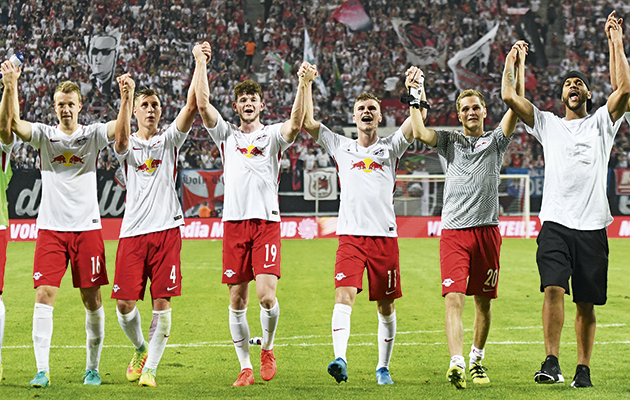No matter how hard they try, and regardless of what they achieve this season and beyond, Bundesliga new boys RB Leipzig will struggle to ever be loved beyond their Saxony base.
In a recent poll carried out by the Braunschweig Technical University, the club bankrolled by the Red Bull energy drink conglomerate were deemed the most unlikable professional outfit in Germany, finishing 36th out of 36.
Already this term, their first ever in the top flight, opposition supporters have wasted little time in reminding them of their unpopularity. Hamburg fans staged a “No to RB” protest march before the teams met in September, while the game with Cologne had to kick off 15 minutes late after opposition supporters blocked the arrival of RB Leipzig’s team coach. Past episodes have even included a bloodied bull’s head being thrown onto the pitch by a Dynamo Dresden fan.
“The project of the promoted club from Leipzig runs counter to all that connects us to football,” declared the Sudtribune Dortmund fan group in a communique. “It’s a scandal that a marketing branch of an Austrian drinks manufacturer has been able to obtain a place in Germany’s top league. It contradicts all sporting and emotional values.”
For many fans of Germany’s long-established clubs, RB – who were playing in the fifth tier of the domestic pyramid only six years ago – simply represent an alien football culture. They are viewed as a Johnny-come-lately, test-tube operation, built on everything that “real” football fans detest: the overt commercialism, the lack of local roots and history, and the nouveau riche spend, spend, spend transfer dealings that saw the newcomers shell out over €50million euros on talent in pre-season – a figure only bettered by Bayern Munich, Dortmund and Wolfsburg.
Large swathes of the Bundesliga’s terrace-dwelling romantic traditionalists genuinely feel that RB are only in the game to sell a product and they see absolutely no merit in what Red Bull owner Dietrich Mateschitz has achieved since buying little SSV Markranstadt in 2009. There soon followed a change
of name – officially they are known as RasenBallsport Leipzig (which translates as “Turf Ball Sport Leipzig”) – and a massive investment of around €300m to date.

Backing…attendances in Leipzig are very healthy
One of the most controversial aspects of the RB revolution is their attitude to German football’s famous “50+1” rule, the notion of which is that fans/members hold the controlling stake in clubs. Although technically signed up to the covenant, RB Leipzig stand accused of merely paying lip service.
Even a non-voting membership card in Leipzig costs €800 – over 10 times what a Bayern supporter would pay – and whereas Ruhr rivals Dortmund and Schalke each have some 140,000 members with the ability to make their voice heard, RB only has a paltry 17, and most of those are Red Bull employees.
Despite the hostility they encounter, the club have gone from strength to strength on the pitch and that success has continued into this season. Meticulously organised by coach Ralph Hasenhuttl, they are excellent in their pressing game, full of vim and desire, and could not have made a more impressive start to life in the top tier, pulling off a shock 1-0 home victory over last term’s runners-up Dortmund, thumping Hamburg 4-0 away and then holding Champions League participants Borussia Monchengladbach to a 1-1 draw.
Indeed, in some ways, RB are actually a positive for the Bundesliga, not least in their devotion to youth. The club have a policy of only signing players under the age of 24 and this summer they brought in central midfielder Naby Keita from RB affiliate club Salzburg, striker Timo Werner from Stuttgart and Scottish winger Oliver Burke, who less than a fortnight after arriving in a €15m deal from Nottingham Forest, came off the bench to set up the winner against Dortmund.

Ralf Rangnick regarded as the architect of the club’s success.
Widely regarded as the architect of the club’s success story, director of sport Ralf Rangnick – who also served as coach in their promotion-winning campaign last season – says it makes perfect sense to have a squad with an average age of just 23. “To my mind, experience can be overrated,” says Rangnick.
RB are also undeniably putting east German football back on the map. Following Energie Cottbus’ relegation from the Bundesliga in 2009, the former DDR has been a top-flight wasteland for seven long years, and as for the city of Leipzig – the birthplace of Deutschland’s football federation – it had not witnessed an elite fixture since the spring of 1994, when VfB Leipzig (who are once again playing under their former name of Lokomotive Leipzig) finished bottom of the pile.
Critics might like to label RB Leipzig as a “plastic club”, but in terms of support they are anything but. While other non-member clubs such as Wolfsburg and Hoffenheim have to bend over backwards to attract people through the gate, the fan scene at the 43,000 Red Bull Arena – the old Zentralstadion which was sumptuously renovated for the 2006 World Cup – is flourishing. The team averaged gates of 28,616 in the second tier last term, and this season they are comfortably selling out on a regular basis.
Unfortunately for the purists, with their financial support, outstanding infrastructure, Rangnick’s know-how and a solid plan, RB Leipzig are here to stay.







